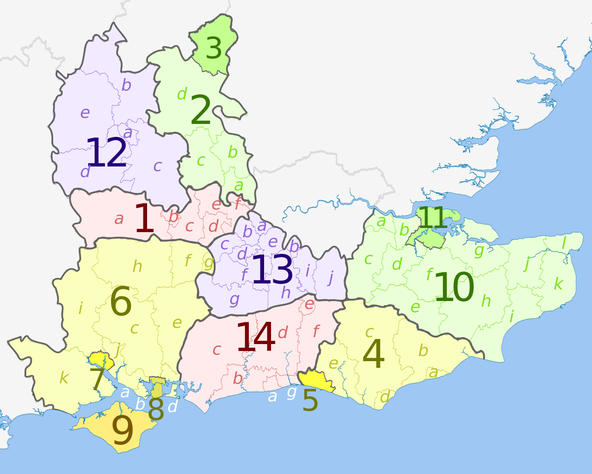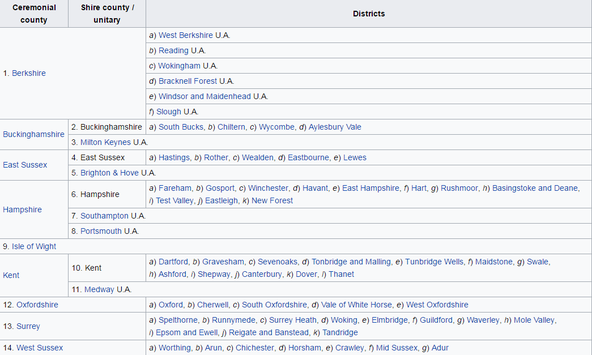Devolution in Central Southern England
by Martin Rogers
3 Jan 2018
Local government representatives, academics and others from Central Southern England gathered recently in Winchester to discuss devolution in the region. This was the third in a series of events across the country organised by the British Academy as part of the Governing England programme. The discussion at Winchester Cathedral visitor centre took place just a week after the new Isle of Wight Council leader indicated his opposition to the Solent Combined Authority proposal despite the recent publication of a consultation which found significant public support for it.
Central Southern England
The geography of ‘Central Southern England’ has complicated efforts to devolve power to the region. While devolution to Scotland and Wales, or regions such as London and Greater Manchester, has been built on shared identity and administrative history, little of this exists to bind Central Southern England, which consists of Berkshire, Oxford and Oxfordshire, Hampshire, Portsmouth, Southampton and the Isle of Wight.
The Story So Far
Moves to devolve greater freedom over spending began with a number of City Deals approved in 2013 and 2014. City Deals for Thames Valley Berkshire, Portsmouth and Southampton and Oxford and Oxfordshire focused on economic growth and investment in key areas such as infrastructure, but, unlike the later devolution deals, they did not include a requirement to change governance arrangements, for instance by introducing Mayors.
Devolution deals
There have been several proposed devolution deals across Central Southern England with varying degrees of success. The first proposed deal came in Autumn 2015 when Hampshire and Isle of Wight Councils (areas 6, 7, 8 & 9 on the map below) submitted a bid to Government to create a ‘Southern Powerhouse[1]’. A key part of this bid was the commitment to build 80,000 homes by 2025. The Southern Powerhouse proposal appears to have faltered over concerns around the geography of the deal[2].
In May 2016, a ‘Devolution Prospectus’ was published for a ‘Heart of Hampshire’ Combined Authority (6c, 6f, 6g, 6h, 6i, 6k) separate from the ‘Southern Powerhouse’ proposal[3]. Opposition to an elected Mayor for all of Hampshire and the Isle of Wight was cited, alongside geography, as being behind the proposals for a new and separate Combined Authority. The Heart of Hampshire deal would also include Hampshire County Council and the Enterprise M3 Local Enterprise Partnership. This deal intended to focus on economic growth, skills, infrastructure and homes.
In October 2016, the results of a public consultation on the prospect of a new Solent Combined Authority (7, 8 & 9) were published. This consultation, of over 2500 respondents, found that 71% of respondents supported devolution, but views on the position of Mayor were mixed[4]. In October 2016, Isle of Wight Council (9) voted not to proceed with plans for the Combined Authority due to concerns over public support for the deal and the finances on offer[5]. However, later in October 2016 a second vote was held and plans were agreed for a joint Solent Authority consisting of the Isle of Wight, Portsmouth and Southampton[6]. On the 26th January 2017, it was reported that the Solent Combined Authority was “almost certainly dead”. Portsmouth Council leader Cllr Donna Jones outlined her concerns about the likelihood of gaining the agreement of the Government due to the lack of local consensus after the new Conservative leader of Isle of Wight Council outlined his opposition to the existing bid, in part due to concerns of the potential dominance of Portsmouth and Southampton[7].
Separately from the above developments, in April 2016, a briefing document was published which outlined plans to create a Combined Authority for Oxford and Oxfordshire (12)[8]. On 19th December 2016, Oxford City Council received a recommendation that the Council support the principle of the submission of a devolution bid to Government which consisted of a Combined Authority under an elected Mayor[9]. On 6th February 2017 Oxfordshire City Council ‘resolved to approve’ the City’s inclusion in the devolution bid as part of a Combined Authority under a directly elected Mayor[10].
Which powers should be devolved?
The question of what devolution is ‘for’ is very much a live one, both within Central Southern England and beyond. There is a distinction between devolution and local government reorganization, but too often debates around devolution become overly focused on reorganization. The forum heard that devolution deals, and powers to devolve, have been the product of compromise between what powers the government wants to devolve and what the body receiving the power, whether existing or new, wishes to have devolved. The EU referendum was identified by one attendee as a key opportunity for ‘subsidiarity’ (moving power to more local levels), if powers and funding repatriated from the EU (for instance relating to regional economic development) can bypass central government and be held at local levels. One key concern with the wider issue of devolution, echoed at this forum, is that, in order for devolution to be a success in the long term, powers must be held permanently at a sub-national level rather than gifted temporarily with Whitehall retaining the option to recentralise them.
Granting greater freedoms to local authorities can lead to improved integration of policy and services. The forum heard that a great appetite existed for improved coordination between businesses and education in the region, such as through Further Education colleges. A lack of coordination between educational institutions and employers had resulted in a significant misalignment between demand for and supply of skills. In Southampton, for example, currently five times as many people leave Further Education colleges with skills in hairdressing as there are hairdressing jobs available.
The political principles and ideologies of Government can have a significant impact on the powers that may be devolved. The forum heard that skills is an example of this as, if the Government is ideologically committed to a free market in skills then it will be reluctant to devolve powers which it thinks should not be held by the state at any level. This is an issue that cannot be resolved in the short term, and speaks to concerns around power being ‘lent’ temporarily.
Local authority attendees advocated greater autonomy in two other specific areas, in addition to skills and infrastructure: social care and fiscal devolution. One Council leader suggested that, given the financial importance of social care for all branches of government, Local and Combined Authorities will have a strong case in favour of devolution if they can present it as a solution to the current pressures on social care. However, one Council Leader expressed concern that, while under the Solent Combined Authority deal, the combined authority would receive additional income of £900 million over 30 years for infrastructure projects, and would retain 100% of its business rates, Central Government may ‘give with one hand and take with the other’.
Geography
Central Southern England is not a region with a strong collective identity, and attendees emphasised that it is a poly-centric area. While Hampshire may have existed as a defined area for longer than England, North and South Hampshire are distinct. One attendee from Oxfordshire told how that area fell between two stools: south of the ‘Midlands Engine’, north of the ‘Southern Powerhouse.’ Considerations of geography are key for devolution, and revolve around the question of what devolution is for. If devolution is to follow the ‘Powerhouse’ logic, with its emphasis on economic activity and productivity, then Functional Economic Areas are a logical geographical structure. If devolution is to serve other purposes, such as to improve governance or service delivery, then other geographical demarcations make prove optimal, for example utilising the current boundaries. An emphasis on strategic planning or integrated service delivery may best utilise yet other boundaries. Answering this question is key to the success of devolution, though the need to encompass all these considerations may explain the difficulties in asserting certainty over boundaries.
Taking account of the varied geography of devolution deal areas can be key to success. Many attendees felt that Central Government had been too settled on the London/Manchester model of devolution to a city or City Region which has been too prescriptively and rigidly applied. A common refrain from attendees was that ‘we are not Manchester’. While Manchester is often held up as an example to follow, an attendee with experience of the devolution process there stressed how much time and effort had gone into achieving their deal. It was observed that, while Manchester may often be seen from outside as one homogenous area, it is not. The twenty years of work behind the current arrangements must not be underestimated.
One positive outcome from the devolution process is that deals have encouraged local authorities to work together as they never have before, leading to devolution deal bids coming from what one attendee described as ‘diverse bedfellows’. It was widely felt that too little account is taken of local circumstances, and that a more flexible approach from Central Government would be more helpful to the progress of devolution deals. Local authorities that wish to take part in devolution deals must achieve a certain level of coherence and stability. One attendee with experience of Oxfordshire local government expressed concern that the coherence of local authorities bidding for devolution deals can make or break such deals as Central Government would be reluctant to devolve to a ‘mess’. One attendee cautioned against committing too much time and resources to trying to identify perfect and logical boundaries as people move and situations change. Devolution deals may perhaps be most successful if the Government’s flexible approach to boundaries is continued.
Mayors
Attendees at the roundtable event raised questions as to whether Mayors justified the emphasis placed on their roles in devolution deals. Advocates emphasise that a Mayor would provide a single point of accountability for an area and have the potential to provide a strategic overview of their area, relating to infrastructure developments for example. However, the Mayoral model has proved controversial in many areas. One attendee involved in a proposed devolution deal within Central Southern England emphasised that the potential deal had brought together a fragile coalition of partners which held together for the deal on offer, before the Central Government’s imposition of a Mayor resulted in the deal collapsing.
The positive democratic impact of Mayors has yet to be proven. Data[11] on public support for Mayors has indicated no public clamour for the post, and no increase in turnout where Mayors are present. Additionally, a number of referendums across England saw the option of a directly elected Mayor rejected in many places[12]. If Mayors are to be a prescribed part of these devolution deals, then public support at a meaningful level ought to be secured. Attendees argued that the public were concerned at the possible imposition of an additional layer of sub-national government without clear purpose or accountability. Ultimately, it was thought that outcomes, rather than processes or the structure of local government, are what interests the public.
The Democracy Matters Citizens Assembly offers a potential strategy for engaging the public in matters of devolution. The Democracy Matters project is a partnership of university researchers and civil society organisations supported by the Economic and Social Research Council and was set up to foster civic engagement on constitutional matters. In their Assembly South work, a group of twenty-three citizens and six councillors from the Solent and Isle of Wight region was convened over two weekends in October and November 2015 to discuss governance of their local area. The aim was to ‘select the citizens randomly to be broadly representative of the local adult population’[13]. The Citizens Assembly South report was published in January 2016 and demonstrated that the wider public are both willing to engage with constitutional concerns and are capable of making useful contributions and proposals. However, questions were raised as to whether such a forum would be a legitimate way of settling constitutional issues. These concerns included the issue of who would be involved in the process and their selection, how participants could be encouraged to focus on the issues at hand, whether and how the results of this forum could be implemented and concerns around the practicalities of rolling out such events more widely.
Relationships
Relationships play a key role in the success of devolution and the role of local Members of Parliament is of particular importance. Those present expressed concerns that MPs in Central Southern England have been less effective lobbyists for their area than in other areas such as Manchester and Yorkshire. Attendees felt that MPs would be more likely to give their support to devolution if it could be demonstrated to be effective. It was widely felt that Mayors and MPs working together for the good of an area would show both in a positive light, allowing MPs to lobby for their region and to ‘own’ some aspects of the successes. Manchester was frequently cited, given that a deal for further powers had been secured. Additionally, having bodies such as local authorities working together may highlight the strengths and untapped potential of an area. Devolution deals have already created alliances between local authorities, and these must be built on to secure the success of the devolution agenda. The prospect of possible devolution deals has encouraged the cooperation of groups that might not have otherwise done so. The deals have continued to progress through changes of personnel and administration leadership – demonstrating that meaningful local relationships can be built to last.
Concluding comments
Devolution deals in Central Southern England have not been universally successful, and no Mayors in the region are set to take office in May 2017. The political will exists in the region to press ahead with devolution but there are real issues which have so far prevented the success of the project. A lack of coherent identity within the region has undermined the potential devolution deals, with the Isle of Wight declining to support the Solent deal for fear of being overwhelmed by Southampton and Portsmouth.
So far, the prospect of devolution has forged and strengthened relationships across the region, and these may be key to successfully achieving devolution. But the post of a Mayor continues to prove controversial, and has caused one devolution deal in Hampshire to collapse.
Calls for greater clarity around the desired ends of the English devolution project continue to be made, including recently by the Public Accounts Committee[14] and IPPR North[15]. Greater clarity over the aims of devolution and increased flexibility over the post of Mayor may well determine whether there is life in devolution deals repeatedly declared ‘dead’.
Martin Rogers is a Policy Adviser at the British Academy working on the Governing England project.
This blog is produced as part of the British Academy Governing England Programme.
Map of Central Southern England

Map Source: Dr Greg and Nilfanion. Contains Ordnance Survey data © Crown copyright and database right 2011

[1] http://www.bbc.co.uk/news/uk-england-hampshire-34052509
[2] https://onthewight.com/about/southern-powerhouse/
[3] http://www.winchester.gov.uk/about/devolution/devolution/
[4] http://www.solentdeal.co.uk/wp-content/uploads/2016/10/Solent-Deal-Consultation-Report.pdf
[5] http://www.bbc.co.uk/news/uk-england-hampshire-37713481
[6] http://www.bbc.co.uk/news/uk-england-hampshire-37754318
[7] http://www.bbc.co.uk/news/uk-england-hampshire-38754798
[8] https://www.oxfordshire.gov.uk/cms/sites/default/files/folders/documents/aboutyourcouncil/Public%20service%20reorganisation%20for%20Oxfordshire%20%20%20No%202%20-%20April%202016%20FINAL.pdf
[9] http://mycouncil.oxford.gov.uk/mgDecisionDetails.aspx?IId=13667&Opt=1
[10] http://mycouncil.oxford.gov.uk/ieDecisionDetails.aspx?ID=1257
[11] http://onlinelibrary.wiley.com/doi/10.1111/j.1467-9248.2007.00705.x/full
[12] http://www.bbc.co.uk/news/uk-england-17854687
[13] http://citizensassembly.co.uk/assembly-south-overview-report/#Summary
[14] https://www.localgov.co.uk/MPs-call-for-clarity-over-%E2%80%98high-risk%E2%80%99-devolution-strategy/42250
[15] http://www.ippr.org/files/publications/pdf/rebooting-devolution_Feb2017.pdf?noredirect=1

